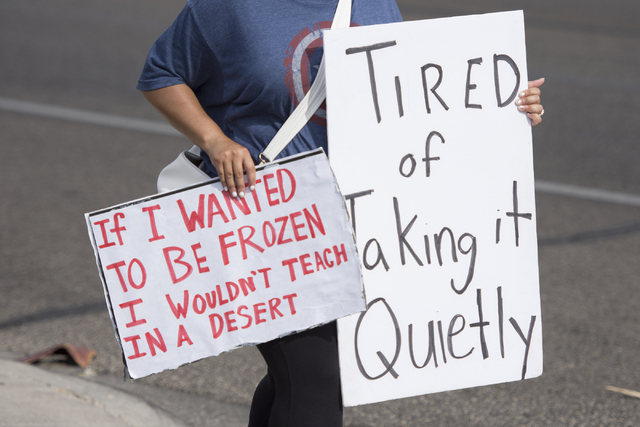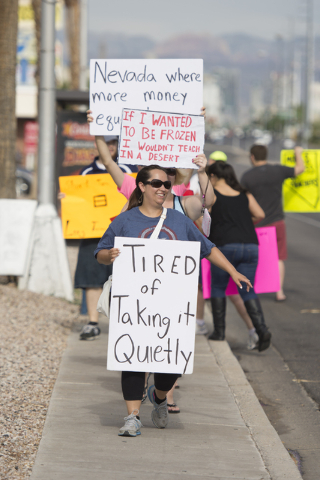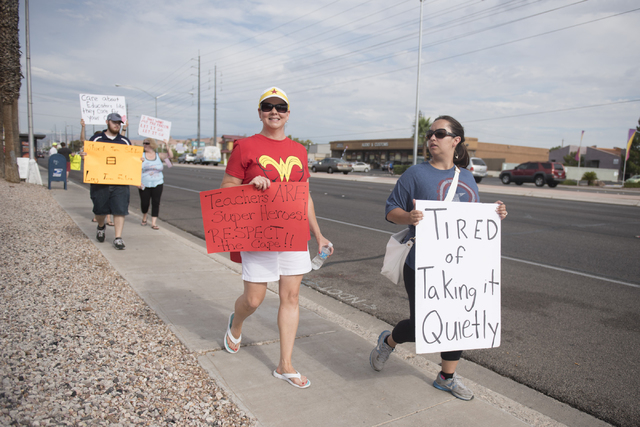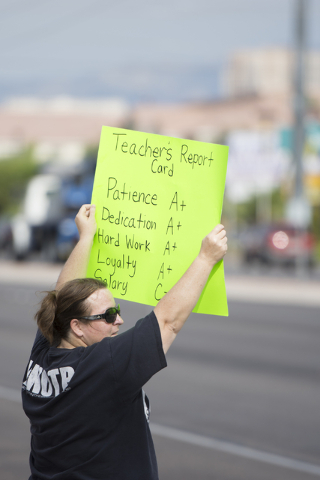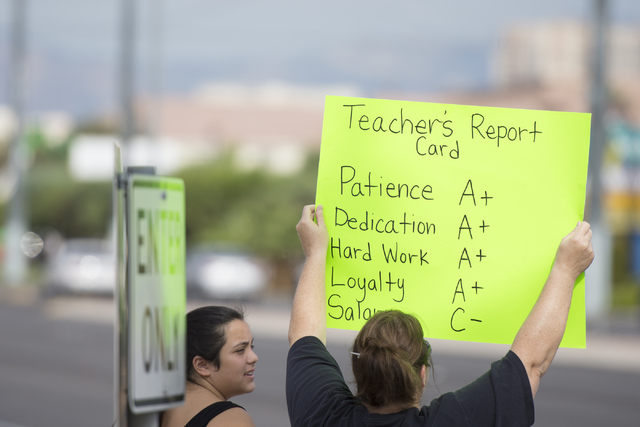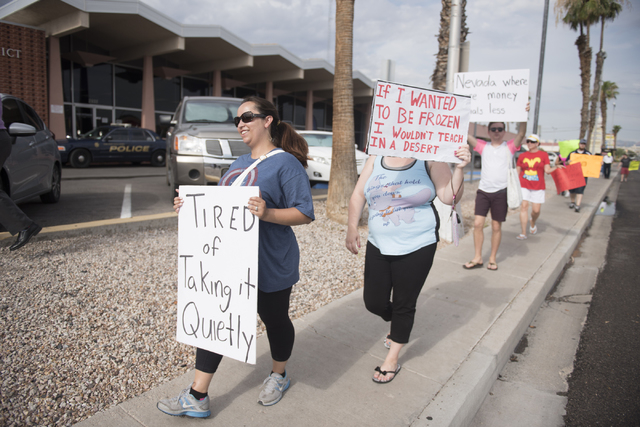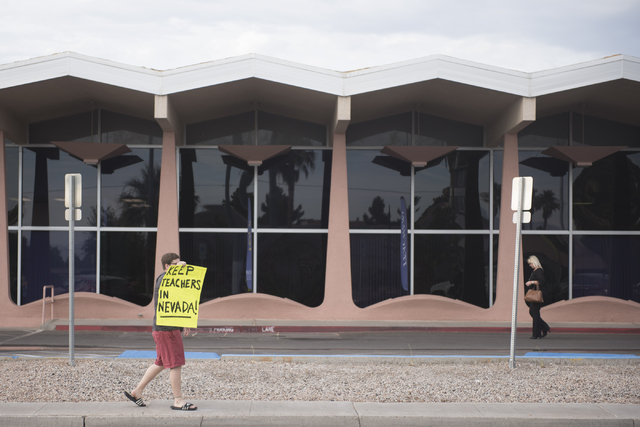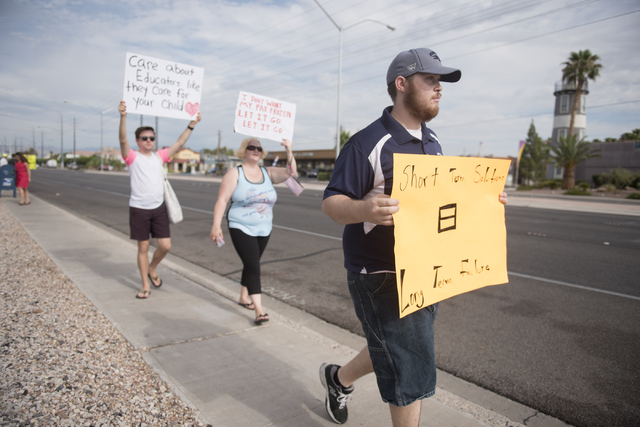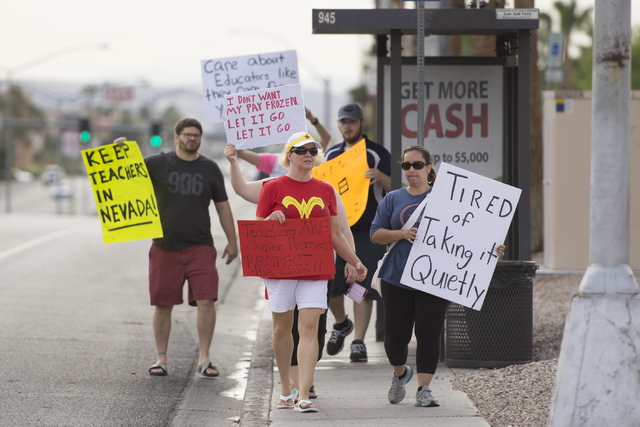Financial cuts, new state laws shadow CCSD labor talks
Reeling from the announcement that the Clark County School District will offer no pay increases this upcoming year, approximately 30,000 employees now must wait to see what perks — if any — their labor unions will negotiate with the district in the next few months.
The district’s contracts with the administrators, police and support staff unions expired last week, though teachers have about two months remaining on their collectively bargained agreements. While it’s not unusual for all four union contracts to expire around the same time, negotiators on both sides of the table must now consider the impact of new legislation that throws into question many of the benefits school employees historically have enjoyed.
Already, negotiations may have hit a snag with the school board last week approving a $2.3 billion budget for the 2015-16 school year that includes no pay raises for any employee group.
District officials cut pay raises from the budget to help close a nearly $67 million deficit, which they blamed on a $15 decrease in funding per pupil that the state provides to Clark County schools.
The district estimates it will save $32.3 million with the elimination of salary increases, but teachers, support staff and administrators alike reacted with anger after learning that means no cost of living adjustments, compensation for professional development or a hike in district contributions for their health insurance.
THE TEACHERS
For teachers and other licensed personnel, negotiations for a new contract began earlier this year, but the district and the Clark County Education Association hit the pause button once state lawmakers started their session in February.
One critical piece of legislation that impacts collective bargaining rules, Senate Bill 241, went into effect last month and prevents a local government employer from offering any increase in “compensation or monetary benefits” after a union contract expires.
“Even if we wanted to, we couldn’t by law provide an increase to anyone because we’re still in negotiations with our employee groups,” CCSD Chief Financial Officer Jim McIntosh said Wednesday.
Teachers, however, will retain their current pay and benefits until their contract expires at the start of the next school year in late August.
Teachers union Executive Director John Vellardita expects to hammer out a new contract before then.
“We’re optimistic,” Vellardita said Thursday. “Our hope is to reach an agreement before the start of the school year.
“I can’t go into details, but we have proposals on the table and expect to bargain in good faith.”
In a letter sent to its members Tuesday, the CCEA outlined its agenda to negotiate a new salary schedule and an increased contribution to teacher retirement plans.
Vellardita said he will press the district to re-examine its balance sheets to find other departments and programs to cut instead of salary increases. He didn’t specify items he would trim from the budget, but noted the district survived a severe teacher shortage last year by hiring hundreds of long-term substitutes.
Because teacher contracts extend through the summer, McIntosh couldn’t cite an estimate of how much the district saved through substitutes. However, he added the 2015-16 school year budget already incorporates that amount because it continues to face difficulties in filling classroom vacancies.
THE SUPPORT STAFF
Health insurance costs remain a top priority for the 11,000 bus drivers, janitors, clerks and other support staff.
The Education Support Employees Association, which represents those workers, recently sat down at the negotiating table and in an online petition has opposed any increase to health insurance premiums.
“We want the same thing everyone else wants: More money and better benefits, as good as we can get,” ESEA President Doug McCain said.
His organization previously negotiated a contract for 2013 through 2015 that included a 2 percent cost of living raise and an additional payment to the state Public Employees Retirement System.
This year the ESEA’s bargaining team has proposed a 6 percent raise in both the first and second years of a new contract and a 1.125 percent raise to offset a hike in employee retirement contributions.
Echoing Vellardita, McCain also doubted the district’s insistence that it simply doesn’t have the money to afford such increases.
“They’re saying they don’t have any money, and we don’t agree,” he said.
School board members on Monday requested the opportunity to revisit the salary issue, and in December, they will vote on a final budget after the district tallies student enrollment and makes any adjustments for new revenue.
Nonetheless, the CCSD’s McIntosh said he didn’t expect the situation to change much by then.
“Unless there’s some direction from the superintendent to find another $32 million worth of cuts … I feel comfortable saying the elimination of salary rollups is going to continue,” he said.
THE POLICE OFFICERS
Representatives for the Police Officers Association of CCSD could not be reached for comment, but the union and district are in the fact-finding portion of an arbitration over its last round of negotiations.
Carlos McDade, general counsel for the district, said he could not predict when an arbitrator would issue a decision.
However, McDade added that SB 241 includes a provision that should make the arbitration process flow more smoothly in other disputes with unions.
Under the current arbitration process, both sides agree on an arbitrator after a dispute arises and must abide by his or her availability to present their cases. The wait can last months and has in the past, McDade said.
Under SB 241, the district and union must select an arbitrator 300 days before a collective bargaining agreement expires and sets his or her dates of availability well in advance of a potential dispute.
“We think potentially this is a game changer,” Vellardita said. “We will no sooner settle this (current) contract and one month later the parties are obligated to select an arbitrator who selects three dates in the month of June — just in case.”
THE ADMINISTRATORS
Stephen Augspurger, who heads the administrators union, also could not be reached for comment.
That organization also must grapple with the impact of SB 241, which prevents administrators earning an annual salary of $120,000 or greater from joining a collective bargaining unit or negotiating contracts with union help.
The prohibition affects 38 district administrators, including several assistant superintendents, department heads and school principals, and the district has been trying to craft a workaround that would keep the longtime staffers from losing their health care benefits.
Health insurance in general could be a flashpoint in future negotiations, as the unions consider a proposed district-wide health care plan. Support staff and police officers currently get their insurance through a plan provided by the district, while administrators have a similar plan through the same company.
“The district explored the option of having a district-wide fully insured plan,” spokeswoman Michelle Booth said.
“The teachers union has opted to pursue its own self-insured health insurance plan,” she added.
Contact Neal Morton at nmorton@reviewjournal.com or 702-383-0279. Find him on Twitter: @nealtmorton.



